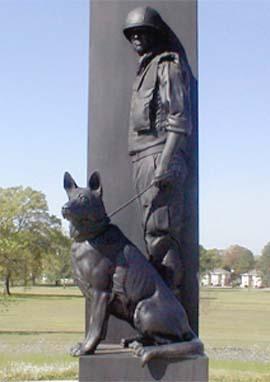 Dogs have been used in war since the beginning of time.
Ever since man domesticated the dog, the dog has defended man from numerous dangers. Dogs have been used in war since the beginning of time.
Ever since man domesticated the dog, the dog has defended man from numerous dangers.
The first modern war that canines participated in was
World War II. During World War II, the army used any breed of dog, but they
soon discovered that some dogs were better suited for this kind of work than others.
Dogs in Vietnam were used for many things. They used
their senses to find dangers like ambushes, booby traps, and tripwires before they
claimed lives. They were also used to set up ambushes, find downed pilots
and runaway ambushers, caches of weapons, food, ammunition, and to guard the perimeter
of military bases.
The dogs in Vietnam performed four basic jobs: scout, sentry,
tracker, and water dogs.
Scout Dogs:
They walked point in front of unit patrols. This was
the most dangerous job for both dog and handler because you were the initial target.
These dogs alerted their handlers to ambushes and booby traps. They were well-trained,
obedient, and alert.
Sentry Dogs:
These dogs defended the perimeter of military bases and were
trained to kill.
Tracker Dogs:
These docile canines pursued fleeing ambushers and located
lost soldiers and downed pilots.
Water Dogs:
They were trained to defend naval bases by sniffing out human
scent underwater. They could smell the human scent in the air released by
the Viet Cong using reeds or pieces of hose to breathe.
The dogs could sniff out ambushes approximately 1,000 yards
away on a good day before shots were fired and lives were lost. They could
detect human scent on land mines, booby traps, and tunnels. The dogs could
hear high-pitched sounds, like the sound of the wind blowing over tripwires.
To indicate that they had found something, the dogs gave
an 'alert.' This was a silent warning that told
the handler that the dog had found something. The alert
could be almost anything. Some dogs' hair stood on end, others crossed their
ears, and some stood on their hind legs. The handler had to observe the dog's
behavior very closely so as not to miss the alert. When an alert was given, the
area was checked out to see what the dog had found.
Two main dog breeds were utilized in Vietnam: the German
shepherd and the Lab. The German
shepherd was most suited for scouting and sentry work because
of its size, temperment, working ability, and its adaptability to various types
of climate and terrain.
The Labrador was used mostly as a tracker dog because of
its excellent sense of smell and tracking ability.
Because the War Dogs were so successful, they were requested
by units all across Vietnam. However, there were not enough dogs to meet this
demand. So the military began Canine Recruitment Drives where owners donated
their beloved pets to the war.
These dogs had to be changed from household pets into soldiers.
They went through an intense
12-week training session, as did the handlers (Most were
trained at Fort Benning, GA but some were trained elsewhere).
During the first 6 weeks, the dogs were taught basic obedience.
The dogs ran obstacle courses and their handlers were taught how to care for their
canine companions. By the time the first 5 or 6 weeks had passed, the dog
and handler had bonded.
The next 6 weeks of training were spent in an area like the
bush in Vietnam. There the dogs were trained on scouting ambushes, tripwires,
caches of weapons and supplies during both the daytime and nighttime. The
handlers and dogs stayed in this place all week, living in tents and eating c-rations.
Handlers learned how wind direction, terrain, and other things affected the alerts
the dogs would give. After the dogs were trained, they were sent to Vietnam
and paired up with handlers that suited their
personalities.
When troops were withdrawn from Vietnam, the handlers were
overjoyed because they were finally going home, but they were also concerned about
what would happen to the dogs they had become so attached to.
The military destroyed the helicopters, tanks, and other
equipment used in Vietnam. They considered the dogs 'equipment,' and all the
heroic dogs were to be destroyed. "In the rush to leave Vietnam behind, these
heroic canines were forgotten." (WD Documentary)
After the public heard about this, from stories the handlers
had written and published, the military began
to place some of the dogs in quarantine to be brought home.
These dogs were checked for diseases and other health problems. Of the over
4,000 dogs that served their country in Vietnam, only 204 legally returned to the
States. Some dogs were snuck home by their handlers.
The reason that only 204 dogs returned home is that the military
decided that the risk of disease was too much. They told the veterinarians
that a law had been passed that stated "No animals were allowed from Vietnam."
There was no such law. The vets were given two choices for the dogs:
they were to be euthanized or given to the South Vietnamese army (who would likely
eat them).
The military kept few records of the War Dogs but more than
4,000 dogs and 10,000 handlers served in Vietnam. There would be a lot more than
50,000 names on the Vietnam War Memorial if it weren't for
these courageous canines
|